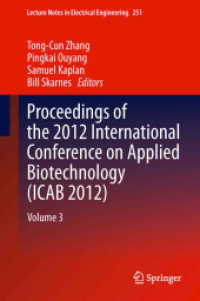- ホーム
- > 洋書
- > ドイツ書
- > Social Sciences, Jurisprudence & Economy
- > Politics, Society, Work
- > political science
Full Description
Since ENPs are used in many industries, including cosmetics, agriculture, medicine, food technology and waste management, their transport through biogeochemical cycles is an important focus of many studies today.
Specifically, ENP-microbe interaction has been analysed with regard to disease treatment for plants;








